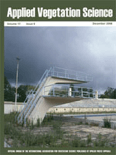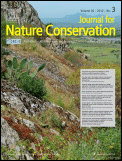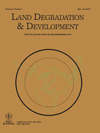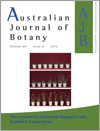
APPLIED VEGETATION SCIENCE
Scope & Guideline
Navigating the complexities of vegetation science with authority.
Introduction
Aims and Scopes
- Vegetation Dynamics and Community Ecology:
The journal extensively covers studies on the dynamics of plant communities, including species composition, diversity, and interactions among species within various ecosystems. - Restoration Ecology:
A significant aim is to publish research that informs and enhances restoration practices, focusing on methodologies and outcomes for restoring degraded habitats and promoting biodiversity. - Functional Ecology and Trait-Based Approaches:
Research often employs functional traits of plant species to understand ecological processes and responses to environmental changes, providing insights into ecosystem functioning. - Land Use and Management Impacts:
The journal examines the impact of different land use practices and management strategies on vegetation, aiming to provide evidence for sustainable land management. - Technological Integration in Vegetation Science:
There is a growing focus on integrating technology, such as remote sensing and machine learning, to enhance data collection and analysis in vegetation studies.
Trending and Emerging
- Machine Learning and Remote Sensing Applications:
There is a notable increase in studies employing machine learning and remote sensing technologies to analyze vegetation dynamics and support ecological research, enhancing predictive capabilities. - Invasive Species Management:
Research addressing the management of invasive species and their impacts on native plant communities is becoming increasingly prevalent, highlighting the need for effective control strategies. - Climate Change Impact Studies:
The journal is seeing a rise in studies focused on the impacts of climate change on vegetation patterns and community dynamics, underlining the urgency of understanding ecological responses to global change. - Ecosystem Services and Biodiversity:
There is growing attention on the relationship between plant diversity, ecosystem services, and human well-being, emphasizing the importance of conserving plant communities in the context of ecosystem functioning. - Restoration Techniques and Success Evaluation:
An emerging focus on innovative restoration techniques and the evaluation of their success is evident, with researchers exploring new methodologies for enhancing biodiversity and ecosystem resilience.
Declining or Waning
- Traditional Phytosociology:
Research focused strictly on phytosociological classification without integrating modern ecological theories and technologies has decreased, as the field moves towards more dynamic and functional approaches. - Descriptive Studies without Management Implications:
There is a waning interest in purely descriptive studies that do not provide management or restoration implications, as the journal increasingly values applied research that addresses real-world challenges. - Basic Taxonomic Studies:
Basic studies on plant taxonomy and identification are becoming less frequent, with a shift towards studies that connect taxonomy to ecological function and conservation.
Similar Journals

PHYTOCOENOLOGIA
Bridging Research and Ecological InsightsPHYTOCOENOLOGIA, published by GEBRUDER BORNTRAEGER, is a prominent journal in the field of Plant Science, holding a prestigious position in the academic landscape with a 2023 Scopus rank of #235 out of 516 in its category, reflecting its contributions to agricultural and biological sciences. Since its inception in 1987, the journal has provided a vital platform for researchers, offering insights and disseminating advances in phytoecology and related disciplines. With its strong commitment to quality, PHYTOCOENOLOGIA is classified in the Q3 quartile, making it a valuable resource for professionals and students alike. The journal welcomes diverse research articles, reviews, and case studies that enhance our understanding of plant communities and their ecological dynamics. Although it operates under a traditional access model, it continues to foster a collaborative environment for scholars eager to explore critical issues in plant science.

Journal of Fish and Wildlife Management
Exploring the intersection of ecology and wildlife management.The Journal of Fish and Wildlife Management, published by the U.S. Fish & Wildlife Service, serves as a vital resource for scholars, researchers, and professionals in the fields of Animal Science, Ecology, and Conservation Biology. With its ISSN 1944-687X, this esteemed journal has been disseminating critical research findings since 2010, contributing significantly to the understanding of fish and wildlife conservation practices and their ecological impacts. Despite its Q3 category rankings in various disciplines as of 2023, it provides a platform for innovative research that influences policy and management strategies for biodiversity conservation. The journal, although not open access, remains committed to advancing the scientific discourse surrounding wildlife management with articles that emphasize practical conservation efforts and ecological sustainability. Readers can expect a diverse range of articles that promote best practices in the management and conservation of fish and wildlife resources, furthering our collective mission of preserving ecological health and biodiversity for future generations.

JOURNAL FOR NATURE CONSERVATION
Pioneering Solutions for Environmental ChallengesJOURNAL FOR NATURE CONSERVATION, published by Elsevier GmbH, serves as a pivotal platform for the dissemination of applied and theoretical research in the fields of ecology, nature, and landscape conservation. With an ISSN of 1617-1381 and an E-ISSN of 1618-1093, this esteemed journal has earned a notable reputation, ranking in the Q2 category for both Ecology and Nature and Landscape Conservation in 2023. It is indexed in Scopus with commendable rankings, including #67/211 in Environmental Science - Nature and Landscape Conservation, highlighting its significance within the academic community. The journal’s diverse scope captures the complexities of environmental challenges and offers insights beneficial to researchers, conservationists, and policymakers dedicated to preserving biodiversity and facilitating sustainable practices. Situated in Munich, Germany, the journal has continuously contributed valuable knowledge since its inception in 1991, making it an essential resource for those committed to advancing conservation efforts on a global scale.

LAND DEGRADATION & DEVELOPMENT
Bridging the gap between science and sustainable development.LAND DEGRADATION & DEVELOPMENT is a premier academic journal published by WILEY that has been at the forefront of research on the critical issues surrounding land degradation since its inception in 1989. With an impressive impact factor and ranked in the Q1 category across multiple fields including Development, Environmental Chemistry, Environmental Science, and Soil Science, this journal serves as an essential resource for scholars and professionals dedicated to sustainable land management and environmental conservation. Although it currently does not provide open access, its rigorous peer-review process ensures the publication of high-quality, impactful research that addresses vital environmental challenges. The journal aims to foster interdisciplinary collaboration, promote innovative solutions, and disseminate knowledge that not only informs policy but also empowers communities to combat land degradation effectively. Researchers, professionals, and students alike will find the insights and findings published in LAND DEGRADATION & DEVELOPMENT invaluable for advancing their understanding and practices within this critical field.

AUSTRALIAN JOURNAL OF BOTANY
Bridging knowledge and conservation for a greener tomorrow.The Australian Journal of Botany is a prestigious peer-reviewed journal published by CSIRO PUBLISHING, dedicated to advancing the field of plant sciences and ecology. Established in 1953, this journal provides a critical platform for researchers to share original research findings, reviews, and perspectives in subjects ranging from plant biology to ecological interactions, with a focus on Australian flora and its conservation. With an impressive impact factor and categorized in the Q3 quartile in both Ecology, Evolution, Behavior and Systematics and Plant Science, the journal ranks competitively within its fields, allowing authors to reach a diverse audience of professionals, students, and fellow researchers. The journal is accessible in print and electronically through its ISSN: 0067-1924 and E-ISSN: 1444-9862, providing wider access to vital research outcomes that influence environmental policies and natural resource management. As it aspires towards innovation and excellence, the Australian Journal of Botany remains an essential resource for those passionate about the richness of plant biodiversity and ecological understanding.

Physio-Geo
Championing Open Access to Earth Science InsightsPhysio-Geo (ISSN: 1958-573X) is a distinguished open-access journal published by REVUES ORG, dedicated to advancing the fields of Earth and Planetary Sciences, with a special focus on Earth-Surface Processes, Environmental Science, and Ecology. Since its inception in 2007, Physio-Geo has provided a platform for researchers, professionals, and students to disseminate and access high-quality studies that contribute to the understanding of our environment. With a convergence period from 2019 to 2024, the journal aims to bridge disciplinary gaps and foster interdisciplinary research that addresses pressing ecological and environmental challenges. Despite its current Scopus rankings reflecting an early-stage development, the journal is poised to enhance its impact within the scientific community, particularly as it embraces a wider audience through its open-access model. By offering valuable insights and comprehensive analyses, Physio-Geo is an essential resource for those seeking to explore the complex interactions between physical geography and ecological systems.

TUEXENIA
Championing excellence in ecology and conservation science.TUEXENIA is a prominent academic journal dedicated to advancing the fields of Ecology, Management, Monitoring, Policy and Law, Nature and Landscape Conservation, and Plant Science. Published by the Floristisch-Sozioogischen Arbeitsgemeinschaft e.V. in Germany, this journal has established itself as a pivotal resource for researchers, professionals, and students alike since its inception in 1985, with a continued commitment to scholarly excellence through 2024. Distinguished by its consistent Q3 quartile rankings across several related categories in 2023, TUEXENIA serves as a vital platform for the dissemination of innovative research and practical applications that address the pressing challenges in environmental science. While it currently does not support an open-access model, the journal's compelling content is crucial for those seeking to deepen their understanding and contribute to impactful discussions in ecology and conservation. With an increasing audience on platforms like Scopus, TUEXENIA is instrumental in bridging the gap between research and real-world environmental management, making it an essential read for anyone engaged in these dynamic fields.

RUSSIAN JOURNAL OF ECOLOGY
Connecting Scholars through Ecological DiscoveryRUSSIAN JOURNAL OF ECOLOGY, published by PLEIADES PUBLISHING INC, stands as a critical resource within the field of ecology, offering an array of research insights that span various ecological topics. With an ISSN of 1067-4136 and an E-ISSN of 1608-3334, this journal has been consistently disseminating knowledge since its inception in 1996, now converging towards 2024. Despite its current Q4 ranking in the Ecology, Evolution, Behavior and Systematics category, the journal has carved out a niche in the publication landscape, particularly for scholars focused on the rich and diverse ecological phenomena of Russia and surrounding territories. The journal aims to foster interdisciplinary collaboration and innovation by providing a platform for the dissemination of high-quality research. While it currently lacks open access options, readers can expect in-depth studies and analytical discourses that contribute meaningfully to the global understanding of ecological systems. With an impressive Scopus rank, this journal remains an important outlet for researchers, professionals, and students committed to advancing ecological science.

FOLIA GEOBOTANICA
Exploring the intricate connections between flora and fossil.FOLIA GEOBOTANICA, published by Springer, is a distinguished journal dedicated to advancing the fields of Paleontology and Plant Science through the dissemination of high-quality research. With an ISSN of 1211-9520 and an E-ISSN of 1874-9348, this journal has been pivotal in providing a platform for innovative studies from 1994 to 2024. Notably, FOLIA GEOBOTANICA holds a Q3 ranking in Paleontology and a Q2 ranking in Plant Science as of 2023, affirming its relevance and contribution to the scholarly community. The journal is located in the Netherlands at VAN GODEWIJCKSTRAAT 30, 3311 GZ DORDRECHT, and is not an Open Access publication, ensuring comprehensive review processes and scholarly integrity. With Scopus rankings that place it in the 50th percentile for Plant Science and 46th for Paleontology, FOLIA GEOBOTANICA continues to attract researchers, professionals, and students who are keen to explore the intricacies of plant ecology and fossil records, thereby fostering a deeper understanding of ecological and evolutionary patterns.

Ecological Solutions and Evidence
Innovative solutions for a sustainable future.Ecological Solutions and Evidence, published by WILEY, stands as a leading platform in the field of ecology, environmental science, and sustainability, with a commendable reputation starting from its inception in 2020. Operating under rigorous academic standards, this journal has achieved notable distinctions by securing a Q1 category ranking in Ecology, Management, Monitoring, Policy and Law, and Nature and Landscape Conservation, making it an invaluable resource for researchers seeking to address pressing environmental challenges. With a current impact factor reflective of its influential articles, the journal features an international scope, focusing on innovative solutions derived from empirical evidence. Accessible to a global audience, the journal encourages open discourse in the field, further supporting researchers, professionals, and students striving to foster ecological sustainability and informed policy-making. Published in the United Kingdom, it aims to bridge the gap between science and application in real-world contexts, promoting actionable insights and interdisciplinary collaboration.